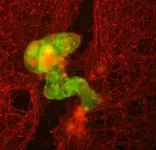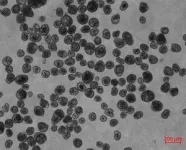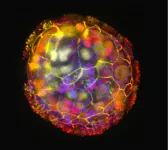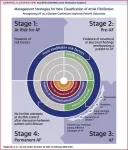(Press-News.org) Kidney stones affect nearly 10% of the global population. For more than three decades, thiazide diuretics, a common medication used for high blood pressure, have been the standard of care for kidney stone prevention because they reduce the excretion of urinary calcium.
However, recent clinical trials have raised doubts about their efficacy in preventing kidney stones. The NOSTONE trial, published in The New England Journal of Medicine in March 2023, failed to find a protective effect of thiazide diuretics on kidney stone disease.
A new Vanderbilt University Medical Center genetic association study of more than 1 million adults challenges those findings. The study, published in JAMA Network Open, used genetic markers to mimic the effect of thiazide diuretics to estimate the long-term medication effect.
“We found that these genetic proxies of thiazide diuretics were associated with a 15% lower risk of kidney stones,” said Jefferson Triozzi, MD, the lead author and nephrology fellow pursuing a Master of Science in Clinical Investigation. “Furthermore, we examined serum laboratory values relevant to the treatment of kidney stones and found that the genetic proxies of thiazide diuretics were associated with higher serum calcium levels, supporting the notion that thiazides affect kidney stone risk by modulating calcium excretion in the urine.”
Most of the adults in the study were participants in the VA Million Veteran Program (MVP), a national research program that examines the effect of genetics, lifestyle and other factors on veterans’ health and wellness.
“The VA Million Veteran Program is the largest and most diverse biobank in the world, now with 1 million participants as of Nov. 11,” said Adriana Hung, MD, MPH, associate professor of Medicine, Division of Nephrology, and senior investigator for this manuscript. “Unique resources like the MVP, with extensive data on clinical condition combined with genomic data, provide a valuable resource for genetically informed drug discovery and drug repurposing. Thiazide diuretics are recommended by international guidelines for the prevention of calcium kidney stones with long-term safety data.”
The all-VUMC team of researchers plans to investigate the underlying mechanisms by which thiazide diuretics lower the risk of kidney stones next.
“Our study highlights the importance of considering genetic proxies to estimate the long-term effects of medications and offers new evidence to support the use of thiazide diuretics for kidney stone prevention,” Triozzi said. “We believe genetic data can help us understand drug mechanisms and perhaps lead to new drug discovery for kidney stone disease.”
Other Vanderbilt collaborators who participated in the study include Ryan Hsi, MD, Guanchao Wang, Elvis Akwo, MD, MS, Lee Wheless, MD, PhD, Hua-Chang Chen, PhD, Ran Tao, PhD, T. Alp Ikizler, MD, and Cassianne Robinson-Cohen, PhD.
END
New study uses genetic data to support use of thiazide diuretics for kidney stone prevention
2023-11-30
ELSE PRESS RELEASES FROM THIS DATE:
Study identifies key algae species helping soft corals survive warming oceans
2023-11-30
BUFFALO, N.Y. --- Scleractinian corals, or hard corals, have been disappearing globally over the past four decades, a result of climate change, pollution, unsustainable coastal development and overfishing. However, some Caribbean octocorals, or soft corals, are not meeting the same fate.
During a two-year survey of soft corals in the Florida Keys, Mary Alice Coffroth, professor emerita of geology at the University at Buffalo, along with a small team of UB researchers, identified three species of octocorals that have survived heat waves. While the coral animal itself may be ...
Scientists build tiny biological robots from human cells
2023-11-30
Researchers at Tufts University and Harvard University’s Wyss Institute have created tiny biological robots that they call Anthrobots from human tracheal cells that can move across a surface and have been found to encourage the growth of neurons across a region of damage in a lab dish.
The multicellular robots, ranging in size from the width of a human hair to the point of a sharpened pencil, were made to self-assemble and shown to have a remarkable healing effect on other cells. The discovery is a starting point for the researchers’ vision to use patient-derived ...
Smart microgrids can restore power more efficiently and reliably in an outage
2023-11-30
It’s a story that’s become all too familiar — high winds knock out a power line, and a community can go without power for hours to days, an inconvenience at best and a dangerous situation at worst. UC Santa Cruz Assistant Professor of Electrical and Computer Engineering Yu Zhang and his lab are leveraging tools to improve the efficiency, reliability, and resilience of power systems, and have developed an artificial intelligence (AI) -based approach for the smart control of microgrids for power ...
Unsafe lead levels in school drinking water: new UMass Amherst study IDs building risk factors
2023-11-30
AMHERST, Mass. – University of Massachusetts Amherst civil and environmental engineers have determined the factors that may help identify the schools and daycare centers at greatest risk for elevated levels of lead in drinking water. The most telling characteristic for schools in Massachusetts is building age, with facilities built in the 1960s and 1970s—nearly a third of the facilities tested—at the greatest risk for having dangerously high water lead levels.
There is no safe exposure ...
Chinstrap penguins asleep thousands of times per day, but only for seconds at a time
2023-11-30
In the wild, nesting chinstrap penguins get more than 11 hours of sleep per day – but not all at once. According to a new study, these birds nod off thousands of times per day, but for only around 4 seconds at a time, cumulatively accruing their daily sleep needs while remaining continuously vigilant over their nests. Sleep seems to be ubiquitous throughout the animal kingdom. Typically characterized by immobility and the relative loss of ability to sense and respond to the surrounding environment, sleep can render animals vulnerable to predation. In humans, insufficient sleep can lead to nodding off, the seconds-long interruption of wakefulness by eye closure, and sleep-related ...
A Neptune-mass exoplanet found closely orbiting a very low-mass M dwarf star
2023-11-30
The discovery of a Neptune-mass exoplanet orbiting the very low-mass M dwarf star LHS 3154 challenges theoretical models of planet formation, according to a new study. The planet, which has a mass at least 13 times that of Earth, tightly orbits a star 9 times less massive than the Sun, demonstrating that small stars can sometimes host larger planets than was previously thought. Planets form in the dense circumstellar discs of gas and dust that surround newborn stars. The amount of material in these structures determines how massive the planets that form ...
Two teosintes made modern maize
2023-11-30
Broad genetic sampling of maize and its teosinte grass ancestors reveals evidence of wild admixture during the crop’s initial domestication and dispersal, according to a new study. The findings clarify the contentious origin of modern maize and raise new questions about the anthropogenic mechanisms underlying its spread throughout the Americas. The domestication of crops transformed human culture. For many crops, the wild plants that modern domesticates are most closely related to can be readily identified by morphological and genetic similarities. Yet, despite its global agricultural importance, the ancestry of modern maize has long ...
A mixed origin made maize successful
2023-11-30
Maize is one of the world’s most widely grown crops. It is used for both human and animal foods and holds great cultural significance, especially for indigenous peoples in the Americas. Yet despite its importance, the origins of the grain have been hotly debated for more than a century. Now new research, published Dec. 1 in Science, shows that all modern maize descends from a hybrid created just over 5000 years ago in central Mexico, thousands of years after the plant was first domesticated.
The ...
Discovery of planet too big for its sun throws off solar system formation models
2023-11-30
UNIVERSITY PARK, Pa. – The discovery of a planet that is far too massive for its sun is calling into question what was previously understood about the formation of planets and their solar systems, according to Penn State researchers.
In a paper published online today (Nov. 30) in the journal Science, researchers report the discovery of a planet more than 13 times as massive as Earth orbiting the “ultracool” star LHS 3154, which itself is nine times less massive than the sun. The mass ratio of the newly found planet with its host star is more than 100 times higher than that of Earth and the sun.
The finding reveals the most massive known ...
Early rhythm control, lifestyle modification and more tailored stroke risk assessment are top goals in managing atrial fibrillation
2023-11-30
The American College of Cardiology (ACC) and the American Heart Association (AHA), along with several other leading medical associations, have issued a new guideline for preventing and optimally managing atrial fibrillation (AFib). The guideline was jointly published today in the Journal of the American College of Cardiology and Circulation.
Atrial fibrillation, or AFib, is the most common type of heart rhythm disorder (arrhythmia), affecting over 6 million Americans, and the number is expected to double by 2030. AFib causes a variety of symptoms, including fast ...







